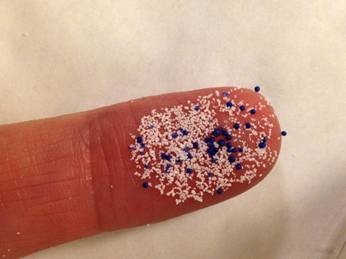On December 28 President Barack Obama signed the Microbead-Free Waters Act of 2015 into law. The measure will phase out the use of plastic microbeads in consumer products over the next several years. The Act passed the U.S. House unanimously in early December and cleared the Senate by voice vote. It prohibits the "manufacture and introduction into interstate commerce of rinse-off cosmetics containing intentionally-added plastic microbeads". Microbeads are pieces of plastic smaller than a pinhead that often appear as colorful little balls suspended in healthcare and cosmetic products like soap and body washes. In recent years many manufacturers added them to numerous products from face wash to toothpaste, touting their exfoliating effects. LCC has been pushing for federal and state legislation to ban the tiny plastic spheres that wash down the drain and end up in our waterways where they harm fish, wildlife and ecosystem health. Many thanks to the New York and Vermont Congressional delegations, particularly Senators Kirsten Gillibrand and Patrick Leahy, who helped champion the ban.
The legislation defines a microbead as "any solid plastic particle" less than five millimeters in size intended for use as an exfoliant. The ban on manufacturing products with beads begins on July 1, 2017 followed by product-specific manufacturing and sales bans in 2018 and 2019.
Little Bead - Big Impact
Why are the little beads such a big deal? It takes a very long time for plastics to break down. A recent study conservatively estimated that in the U.S. 8 trillion plastic microbeads -- enough to cover more than 300 tennis courts -- find their way into aquatic habitats every day! A report by the New York Attorney General's Office found that over 19 tons of microbeads overall are flushed into New York waterways (including Lake Champlain) each year. Microbeads cannot be removed from our waters once they are there so we need to keep them from getting into the water in the first place. Microbeads are actually designed to be washed down the drain and through our pipes with no possibility of recycling or recovery. They're small enough to pass through wastewater treatment facilities and can also enter waterways through combined sewer overflows that bypass sewage treatment plants during heavy storms.
There are numerous studies documenting the physical and toxicological effects of plastic in the environment. Microplastics are of particular concern because they have the potential to be ingested by a much wider range of organisms than large plastic debris, making them and the chemicals they carry bioavailable throughout the food chain. Some microbeads are the size of fish eggs. Larger fish and other aquatic organisms eat them, mistaking them for food. This can result in reduced food consumption, stunted growth and starvation. When plankton, mussels or fish fill up on plastic junk food they are likely to lose their appetites for healthier food. Additionally, plastics absorb toxins such as PAHs, PCBs, and DDT which can be passed up the food chain to fish, wildlife and ultimately, humans.
"We don’t need microbeads to clean our faces, teeth or bodies," said LCC Executive Director Lori Fisher. "There are safer, bio-degradable, non-polluting alternative products that have been used for years that do a fine job of keeping us clean and hygienic without degrading our waterways, taxing our wastewater treatment systems, or confusing the fish."
While major manufacturers like Proctor and Gamble, Unilever, and L'Oreal are phasing out the use of microbeads, there are plenty of companies that took a more responsible approach to product development and never used them in the first place. Seventh Generation, Aveda, St. Ives, Burt's Bees and many other brands already use ground nut shells, jojoba, oatmeal, sea salt, or almond meal as natural exfoliants and abrasives.
Be An Informed Consumer
It will be several years before we see the effects of the ban on retail shelves and in our waterways. Do your part by ensuring you're not purchasing products that still use plastic microbeads. There are effective soaps, toothpastes and body scrubs on the market that don't use plastics as cleaning agents. Check ingredients lists carefully and avoid products with “polyethylene” or “polypropylene” or "polyolefin".
